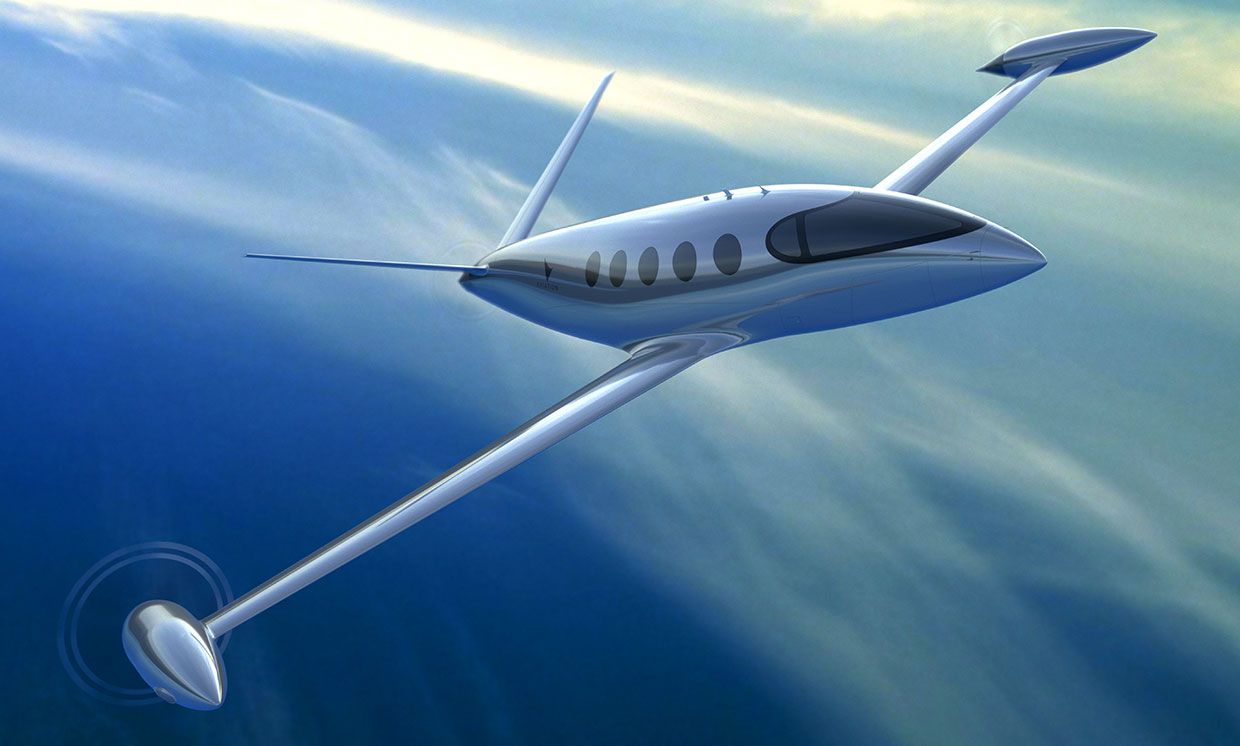Order for First All-Electric Passenger
Airplane Placed by Massachusetts Carrier
Cape Air recently ordered the Eviation "Alice" battery-powered, 9-seat regional aircraft-pointing toward aviation's e-future
Cape Air recently ordered the Eviation "Alice" battery-powered, 9-seat regional aircraft-pointing toward aviation's e-future

Illustration of the
Alice, a three-engine, battery powered airplane.
Illustration: Eviation
Commercial electric aviation took its first steps forward last
month when a Massachusetts-based regional airline announced the first order of
the first all-electric passenger airplane. The "Alice," a
three-engine, battery powered airplane with a 1000-kilometer range on a single
charge, is slated to be delivered to Cape Air airlines for passenger flights in
2022.
The Alice, manufactured by Kadima, Israel-based startup company Eviation, has not yet been certified by the U.S. Federal Aviation Administration. However, the company's e-airplane "could be certified right now to fly," insists Lior Zivan, Eviation's CTO. "It does not need a major rewrite of the rules to get this in the air," he says.
Zivan says the company is "anticipating full certification by 2022."
The Alice, manufactured by Kadima, Israel-based startup company Eviation, has not yet been certified by the U.S. Federal Aviation Administration. However, the company's e-airplane "could be certified right now to fly," insists Lior Zivan, Eviation's CTO. "It does not need a major rewrite of the rules to get this in the air," he says.
Zivan says the company is "anticipating full certification by 2022."

Animated gif from a
video showing Alice's engine and batteries.
The Alice, Zivan says, will be powered by a 900-kilowatt-hour
(kWH) lithium ion battery manufactured by South Korean battery maker Kokam
Battery. (For comparison, the Tesla Model 3 electric car uses a 50- to 75-kWH
battery pack, according to a 2017 investor call from company CEO Elon Musk.)
Cape
Air is a Northeast regional airline that flies to Cape Cod, Martha's Vineyard,
Nantucket, and numerous other vacation and regional destinations. According to
Trish Lorino, Cape Air vice president of marketing and public relations, the
company's historic order of Eviation's Alice aircraft "makes sense for us
because we are a short-haul carrier." Lorino notes that, "For 30
years, we have specialized in serving short-haul routes, particularly to niche
and island destinations."According to Cape Air's website, the carrier currently operates 88 Cessna 402s (which seat 6 to 10 passengers) and 4 Islander planes (9-seat capacity) made by the British company Britten-Norman. The 9-seater Alice e-aircraft thus fits within the Cape Air fleet's general size and passenger capacity.
"Our hope is that electric-powered flight is a reality in the next decade and that there is adoption from the public to view this as a viable, natural form of transportation."
-Trish Lorino, Cape Air Vice President of Marketing and Public Relations
Lorino says that although the carrier has not yet decided which routes will feature the Alice, company officials currently anticipate that e-flights will cover routes that keep the plane close to the company's Massachusetts headquarters. "Short-haul routes 'in our backyard' such as Nantucket, Martha's Vineyard, and Provincetown would be the likely routes," she says.
Eviation CEO Omar Bar-Ohay showcased the Alice at the Paris Air Show last month, featuring an informal tour and 30 minute talk.
Bar-Ohay's remarks at the Show highlighted the differences inherent in designing and engineering an all-electric airplane and a conventional, petroleum-fueled plane. As he pointed out, the Alice has a maximum takeoff weight of 6,350 kilograms (14,000 pounds), but 3,700 kg of that is the battery. (And of course there is no fuel burned, so its takeoff weight is more or less its landing weight.)
Each of the Alice's three motors, according to Zivan, has one moving part. "A similar [petroleum-fueled] reciprocating engine has about 10: six pistons, a crankshaft, oil pump, and a two-shaft gearbox," Zivan says. "Obviously, electric propulsion has a major advantage in both reliability and maintenance."
There are redundant systems in the Alice, Zivan says, in both the propulsion and the battery assembly. The e-aircraft's three engines (two "pusher" motors mounted at the rear ends of the two wingtips and another "pusher" motor mounted at the rear of the plane) have, he says, "mostly dual and for some components triple [redundancy]."
As for the electrical system, Zivan says, "The battery assembly is redundant in many levels, starting at the parallelism of the cells and ending at the number of in-series cells branches. The battery is designed in such a way that any malfunction or failure will result in a minimal reduction in the capacity if any."
Because Alice doesn't burn any fuel in flight, and relies only on cheaper electric charge, the cost of operating the plane is expected to be lower than its petroleum-fueled counterparts. And the noise emitted by a plane with no internal combustion engines is also lower; this is especially true for Alice, given its ability (unique to e-aircraft) to vary its propeller speeds to compensate for crosswinds and to lower cabin noise.
As an early standard-bearer in electric passenger flight, Cape Air says its decision to purchase Alice (the number of electric aircraft that will join its fleet has not been finalized) was also partly motivated by the company's "deep sense of social responsibility," Lorino says. (The company's headquarters is 100-percent solar powered, she says, and the company is now hoping to use sustainable energy sources for charging its fleet of e-airplanes.)
"Our hope is that electric-powered flight is a reality in the next decade and that there is adoption from the public to view this as a viable, natural form of transportation," she says.



Ingen kommentarer:
Legg inn en kommentar
Merk: Bare medlemmer av denne bloggen kan legge inn en kommentar.